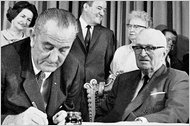Very little that a lawyer needs to know is learned in law school classrooms.
« Back to Discussion
The Case Against Law School
Should the standard three years of law school, followed by the bar exam, be the only path to a legal career?
Allow Anyone to Take the Bar
Updated July 21, 2011, 07:56 PM
George Leef, a graduate of Duke University Law School, is the director of research at the Pope Center for Higher Education Policy.
The legal profession has long sought to turn itself into a cartel. Among its anti-competitive tactics is mandating that prospective lawyers go through a needlessly long and expensive period of education. The truth is that very little that a lawyer needs to know is learned in law school classrooms and that which is essential, particularly legal research and writing, could easily be learned elsewhere.
In the early 1900s, we had a free market in legal education. People could go to a law school, and the institutions varied considerably. Few schools tried to keep students enrolled for three years, since most students thought the benefits of additional years weren’t worth the costs. But the majority of lawyers did not go to law school at all. Instead, they learned their profession while working in law firms. Many became extraordinary lawyers and jurists.
It’s still true that lawyers learn almost everything on the job. Today, however, they must first go through three years of law school, taking a lot of courses they’ll immediately forget. That high, artificial barrier to entry exists only because the American Bar Association lobbied for state legislation making its model of legal education the only path into the profession.
Two consequences of this regulation are that we have more law schools and professors than we otherwise would, and that many poorer people can’t afford legal assistance because lawyers must generate high fees to cover the cost of their degrees.
States should deregulate legal education by allowing anyone to attempt the bar exam. It should no more matter how an individual learned the material for the bar than it matters to an orchestra how a prospective musician learned to play. Law schools now enjoy a captive market, and if they had to compete against other modes of legal education, costs would fall and efficiency would rise.




 George Leef, Pope Center for Higher Education Policy
George Leef, Pope Center for Higher Education Policy
 Rose Cuison Villazor, Hofstra University Law School
Rose Cuison Villazor, Hofstra University Law School
 David Lat, editor, Above the Law
David Lat, editor, Above the Law
 Geoffrey R. Stone, University of Chicago Law School
Geoffrey R. Stone, University of Chicago Law School
 Linda Greene, law professor, University of Wisconsin
Linda Greene, law professor, University of Wisconsin
 Bryan A. Garner, editor in chief, “Black’s Law Dictionary"
Bryan A. Garner, editor in chief, “Black’s Law Dictionary"

 Presidents and Their Debts, F.D.R. to Bush
Presidents and Their Debts, F.D.R. to Bush
 Can World Soccer Root Out Corruption?
Can World Soccer Root Out Corruption?
 What Will the Debt Debate Mean for 2012?
What Will the Debt Debate Mean for 2012?
 The Texas Jobs Juggernaut
The Texas Jobs Juggernaut
 Women's Choices: School vs. Children
Women's Choices: School vs. Children
12 Readers' Comments
Post a comment »The good thing about the bar is that it keeps a lot of incompetent individuals from practicing law. That's a social good.
But allowing any old bum off the street to take and pass it is risky, too.
I flatter myself in thinking I'm a smart person, but I know I'm certainly not the smartest (and not as smart as my friend). And I don't really know anything about the law. There are a lot of dolts out there, too, who will learn to game the bar exam as they do the SAT, GRE, and so on. They'll become lawyers under this plan.
Then when you and I suddenly need a lawyer, we won't know the difference between someone like me or the idiot version of me, who bought a test prep book or took a six-week Kaplan class and aced the exam through sheer force of memorization, and a bona fide law school graduate who struggled through three years of tough tests and competition and still emerged intact.
I'd want the latter to represent me. But I'm sure there'd be a zillion more of the former types out there. We'd work for less. And how would I know the difference? How could I pay for the difference?
Log In to Post a Comment